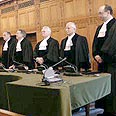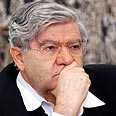

TEL AVIV - The International Court of Justice’s ruling, which harshly criticized the West Bank security fence built by Israel in response to ongoing terror attacks, has some positive aspects, Supreme Court Chief Justice Aharon Barak says.
“We are constantly criticizing The Hague’s ruling, but it also includes many positive things for the State of Israel,” he said. “We should also see the positive in the ruling.”
Barak’s remarks, which came during deliberations on four anti-fence petitions, constitute an implicit attack on decision-makers in Jerusalem, who chose to turn a cold shoulder to the international tribunal.
“I certainly expect the possibility that in the coming years the State would base many of its arguments on the ruling,” he said. “It’s a complex ruling and it includes many arguments in favor of Israel.”
State reiterates need for fence
Monday’s deliberations mostly focused on the decision submitted by the international court, which ruled that Israel’s security fence is illegal. Following the ruling, Barak ordered the State to address The Hague’s ruling in its response to anti-fence petitions by Palestinian residents.
The response offered by the State, which was submitted several months ago and is hundreds of pages long, rejected the ICJ’s ruling and said it did not have the authority to rule on the matter, and also based its decision on subjective, inaccurate documents.
During Monday’s session, representatives for the State reiterated the security and military need for the fence, which stemmed from the Palestinian Intifada.
They said steps have been taken to ease the lives of Palestinians, emphasizing that Israel has compensated Palestinian farmers hindered by the fence.















